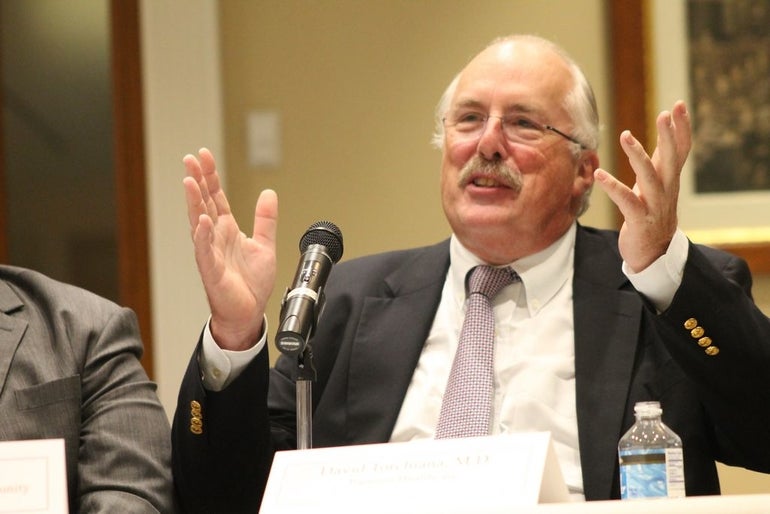New plan calls for increasing opioid treatment access
 Photo/SHNS
"We have an obligation to bring every tool that medical science has available to combat this epidemic and help those suffering from substance use disorder heal and start on the road to full recovery," Partners President and CEO Dr. David Torchiana said.
Photo/SHNS
"We have an obligation to bring every tool that medical science has available to combat this epidemic and help those suffering from substance use disorder heal and start on the road to full recovery," Partners President and CEO Dr. David Torchiana said.
A multi-pronged initiative Neighborhood Health Plan announced Friday aims to reduce the number of opioid overdose deaths by increasing access to treatment.
In hopes of addressing a clinician shortage, the insurer plans to begin offering financial incentives to encourage more providers to offer medication-assisted treatment involving Suboxone and other buprenorphine products designed to treat cravings and withdrawal systems associated with opioid dependency.
Neighborhood Health Plan will also hire recovery coaches, waive co-pays for the overdose reversal drug naloxone and the brand-name version Narcan, and remind pharmacists to notify NHP members that they are eligible for free Narcan supplies when they pick up a prescription for "high-dose narcotic painkillers," according to a press release.
"From a community benefit perspective, I would hope that we're setting the pace here," Tony Dodek, Neighborhood's chief medical officer, told reporters. "We'd like to see others emulate what we're doing."
A total of 1,977 people in 2017 and 2,155 people in 2016 died of suspected or confirmed opioid overdoses in Massachusetts, according to the most recent data from the Department of Public Health.
Buprenorphine, which reduces opioid cravings, is one of a handful of drugs prescribed to treat symptoms related to opioid dependency.
Neighborhood hopes to recruit up to 100 providers and will pay $500 to offset the cost of the training required to dispense the drugs, plus a $2,000 honorarium to practitioners who become certified and then treat at least 10 patients.
"To be honest, we can't be sure that this is going to make a big difference, but the hope is that people who have been considering to obtain the certification, this will be just an added incentive to get them over the threshold so that they'll pursue it," Dodek said.
The state's Health Policy Commission, in a 2016 report on opioid use disorder, labeled increasing access to medication-assisted treatment, or pharmacotherapy, as "a fundamental component to making the health care system more responsive to the needs of patients." The report cited a 2012 statistic showing fewer than half of adults and adolescents suffering from opioid use disorder nationwide received pharmacologic intervention.
The commission's analysis found that the distribution of methadone, buprenorphine and naltrexone providers varies widely throughout the state with "no clear relationship to the burden of the epidemic." Most were clustered in eastern Massachusetts.
According to the analysis, the Berkshires region had the highest rate of opioid-related hospital visits in 2014 -- nearly 70 percent above state average -- but patients there had "comparatively long" travel times for treatment.
Neighborhood, a subsidiary of Partners HealthCare, said it will become the first health plan in the country to hire recovery coaches.
"We have an obligation to bring every tool that medical science has available to combat this epidemic and help those suffering from substance use disorder heal and start on the road to full recovery," Partners President and CEO Dr. David Torchiana said in a statement.
Dodek said Neighborhood has hired one recovery coach and is "actively recruiting" a second. Both, he said, will be "specially trained" and have experience with substance use disorder, and will help plan members who are in recovery. He said most health plans lack a mechanism to reimburse for recovery coach services.
An opioid treatment and prevention bill Gov. Charlie Baker filed last November would, among other measures, establish a commission to recommend standards for credentialing recovery coaches. Baker wrote in his filing letter that recovery coaches play an "important role...in successful long-term addiction treatment."
The commission is included in a Mental Health, Substance Use and Recovery Committee redraft of the bill, now pending before the Health Care Financing Committee.









0 Comments